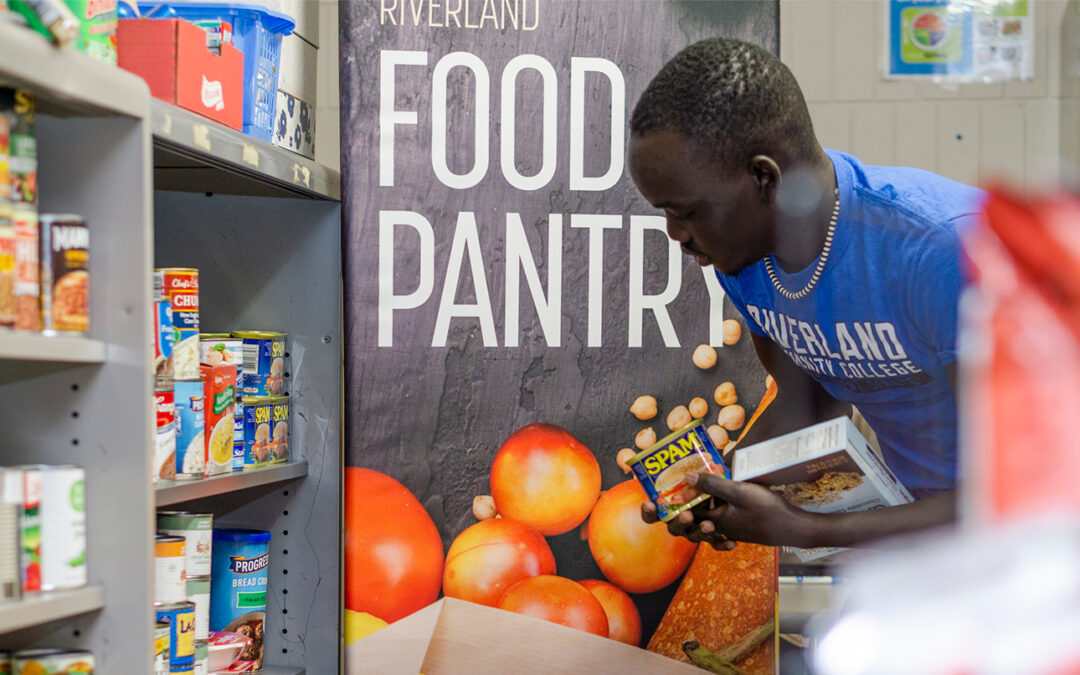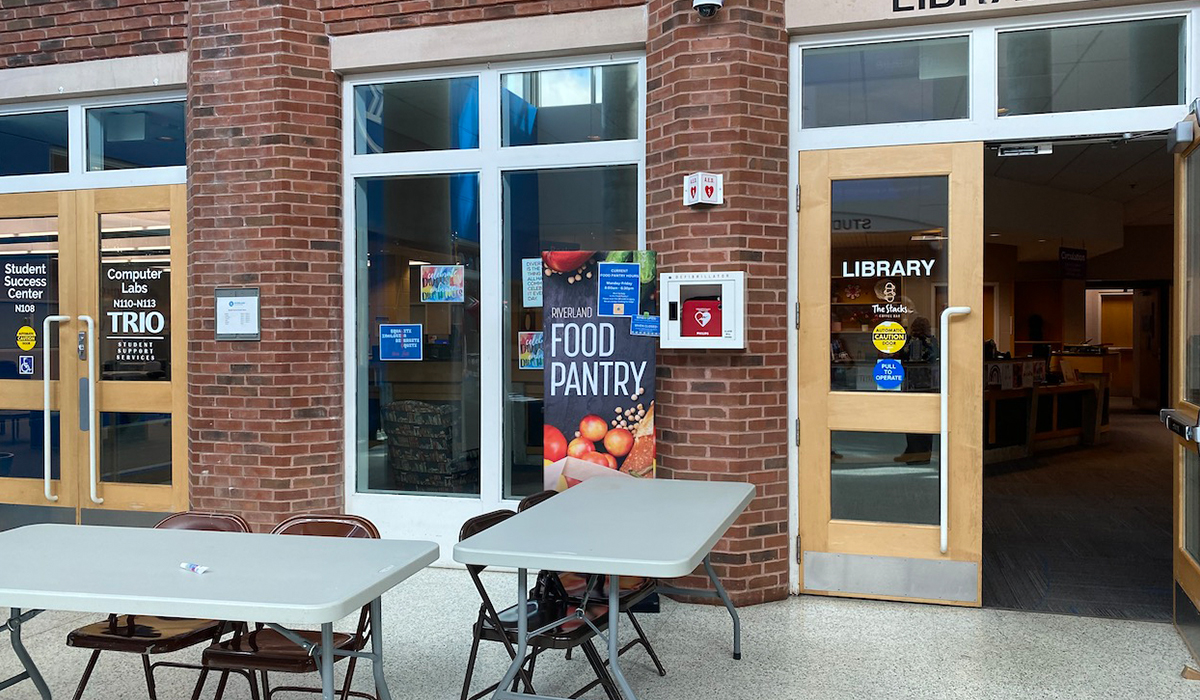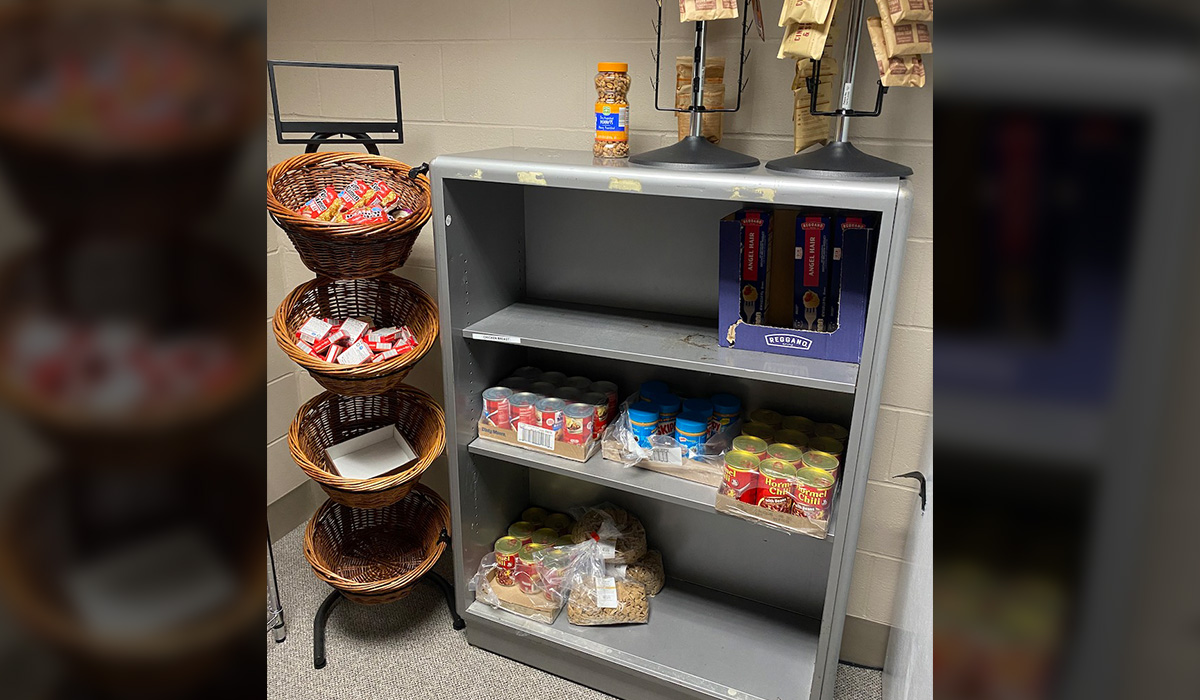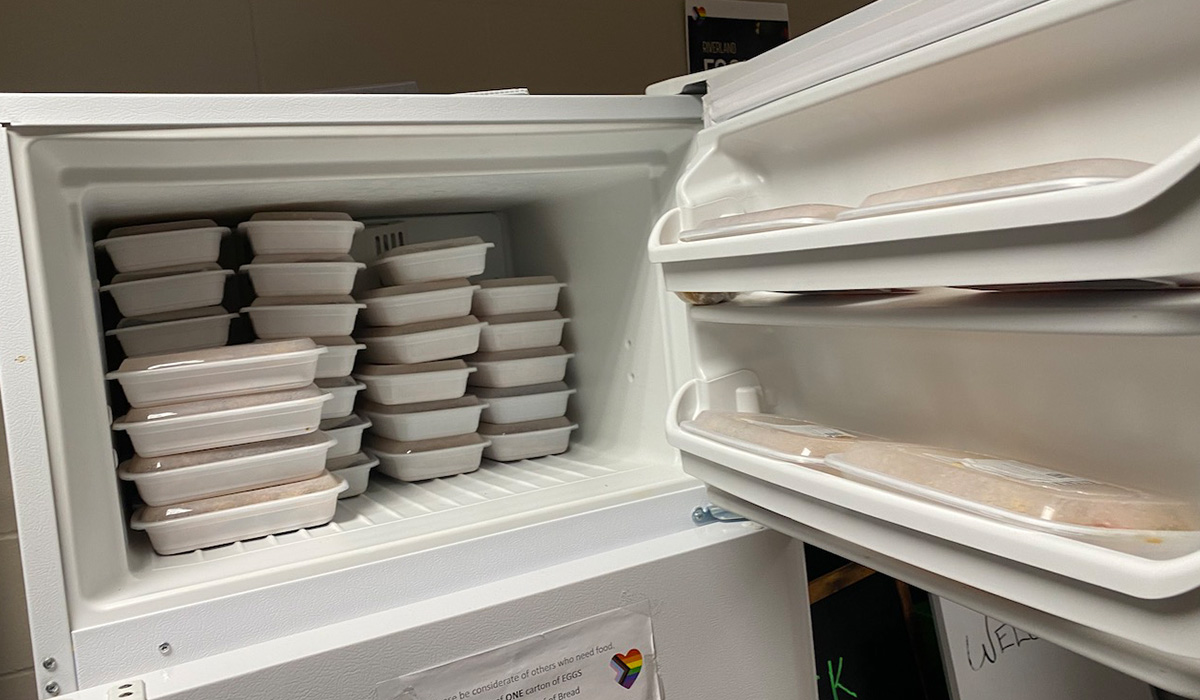By Ethan Watters and Jenny Qi
Riverland Community College tackles food insecurity among its students in collaboration with the Hometown Food Security Project Coalition, Hormel Foods and other community partners.
Riverland Community College President Kathleen “Kat” Linaker describes herself as “a definite anomaly” in her family. The youngest child of five, she was the only sibling to graduate from high school. The fact that she went on to get a PhD at Loyola University in Chicago made her even more of an outlier.
“I grew up in Alberta, Canada,” says Linaker. “My dad was a bus driver, so we were not rich by any stretch of the imagination. We were rural poor. We didn’t have a community college near us. If we’d had access to the opportunities community colleges offered, I think it could’ve been a game changer for many, including people in my family. The work I do now comes from that knowledge.”
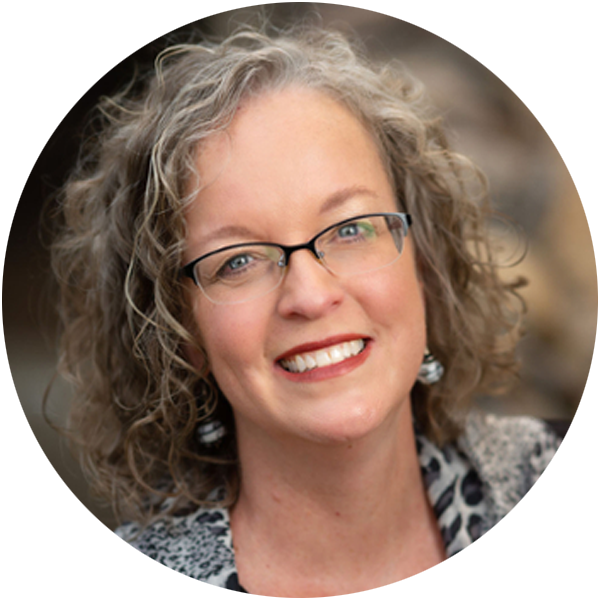
“When you’re hungry, it is hard to concentrate, It’s hard to think. It’s hard to process.”
Kathleen Linaker, Riverland Community College President
Linaker’s personal experience of economic hardship shaped her commitment to addressing food insecurity among the diverse student population of Riverland Community College, where over 50% are food insecure, and some students experience homelessness. Food insecurity is a significant issue among community college students nationwide, with wide-ranging impacts on their health, retention and academic performance.
“When you’re hungry, it is hard to concentrate,” says Linaker. “It’s hard to think. It’s hard to process. It’s hard to learn not only because you are physically feeling hungry, but because our brains run on sugar. If you are in a chronic state of hunger, you are cognitively impaired. You can’t learn if you don’t have food. For this population, it’s no longer about just providing education. It’s about providing everything the students need so they can get out of poverty.”
Multiple Approaches to a Multifaceted Problem
Riverland Community College student Danielle Hernandez-Miller understands the multifaceted nature of food insecurity and economic hardship all too well, as a social worker-in-training and a working mother of three children, one of whom has disabilities. Like Linaker, Hernandez-Miller cites her personal experiences with adversity and food insecurity as the motivation for her work as Outreach Coordinator at LIFE Mower County, where she provides support for those with disabilities and their families.
“It’s important that everyone has access to food without stigma,” Hernandez-Miller says, noting that language barriers can keep people from being aware of and accessing existing resources. “People automatically assume you’re poor, but sometimes there are bigger issues, like being unable to provide food because you’re paying for medical bills or other things.”
A multifaceted problem requires a multipronged approach. Colleges around the U.S. have implemented various initiatives to support students facing food insecurity, including the establishment of food pantries, community gardens and benefits-access programs. More than 700 food pantries operate on college campuses around the country. Food insecurity is a more significant issue at community colleges because of their unique student populations. At Riverland, most students come from public high schools in Austin, and 30%-40% of students are nontraditional students, like Hernandez-Miller, who are pursuing secondary education later in life while juggling the demands of parenthood and jobs.
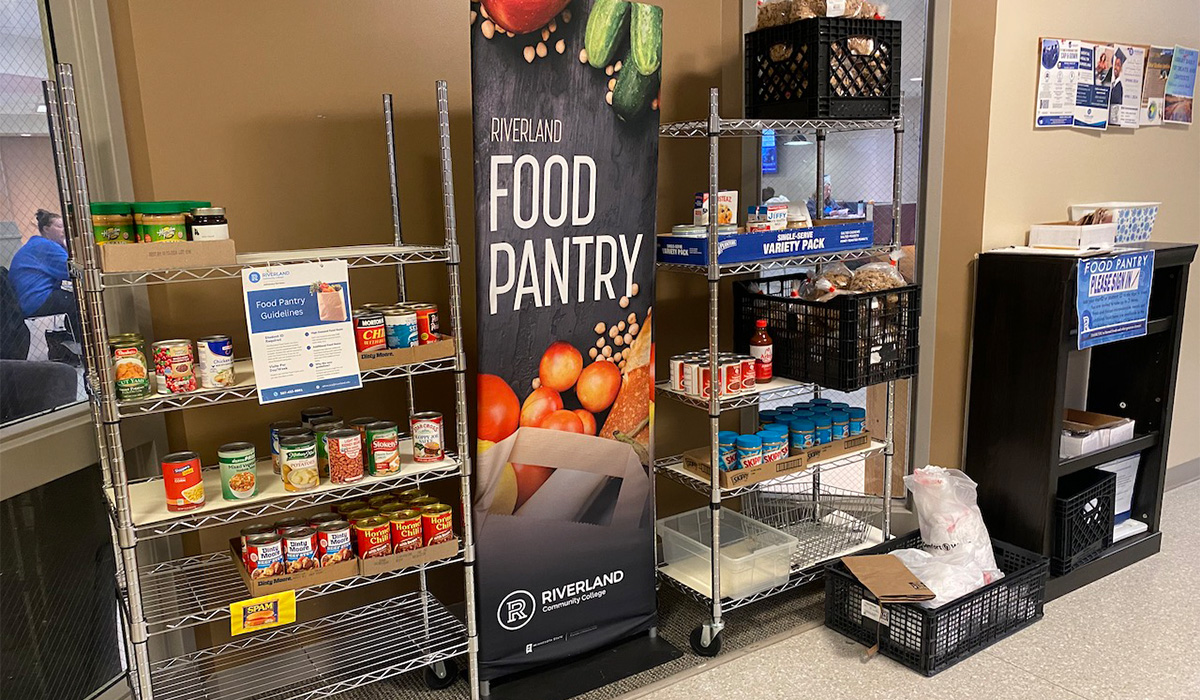
Shelf-stable food at the Riverland Community College food pantry
Riverland operates four food pantries on its campuses. Their main pantry, located in Austin, was recently expanded and now includes two refrigerators, allowing students in need to access both fresh and shelf-stable foods as well as frozen meals made by local restaurants. Students can access these pantries using a personalized ID, enabling the school to track how many people are being served.
To help meet diverse student needs in innovative ways, Riverland’s pantry offers fully prepared to-go meals during the academic year through the Kitchen Coalition program. Administered by Channel One Regional Food Bank and funded by The Hormel Foundation, the meals are packaged by local restaurants and provided refrigerated or frozen.
In addition, CLUES, a nonprofit organization focused on the Latino population, hosts its Canasta Familiar on campus twice a month, distributing free food to all in need, including students and their families.
Linaker described the introduction of accessible food options on campus as transformational for many students, but it can be difficult to keep the pantries stocked. Riverland spends $2,000 a month on supplemental food shelf items, aided by grants and donations to maintain these vital student resources. “The college can’t solve this issue by itself,” Linaker says. “We need to work with our community partners to be able to do this.”
Shelf-stable food and prepared meals available at the Riverland Community College food pantry
Under Linaker’s leadership, Riverland Community College became a key member of the Hometown Food Security Project Coalition in 2023, working to combat food insecurity in Austin, Minnesota and the Mower County community. The partnership with the Hometown Food Security Project has helped build trusted relationships and a willingness to share resources to scale impact together. Her involvement in the project from the start has been instrumental. Shortly after being appointed to her current role, Linaker attended the annual Thanksgiving dinner hosted by the Salvation Army, alongside her family and numerous Riverland students who were volunteering at the event. This is a testament to her deep commitment to building community and supporting local partners.
Riverland’s strategic planning process aimed at addressing food insecurity involves focus groups with community members, students, faculty and staff. Linaker also highlighted the unique advantage of having Hormel Foods and The Hormel Foundation in Austin providing resources and support that are uncommon even in larger cities. “The impact they’ve had on this community is visible.”
Ongoing Challenges and Barriers to Food Insecurity Resources
Hernandez-Miller knows that many people who are struggling with food insecurity are not aware of the resources that do exist. When she was a new mother a decade ago, she remembers not having the mental bandwidth to search for assistance.
“When I was on my journey, I felt alone and lost. When you have a child with disabilities, there’s so much paperwork, so many in-home visits, so many hospital visits. And where do you even go for help? You stand in line forever, and you don’t always get the answers you’re looking for, so it’s like, is it even worth my time?” Recalling the overwhelm of being at the hospital with her daughter, she said, “The social worker just asked, ‘Do you want resources?’ You can say yes, but what do you ask for? You don’t really know at that moment.”
Hernandez-Miller understands that even when resources exist, it is often difficult to reach the people in most need because of language barriers, lack of transportation or lack of access to technology. All of these difficulties, Hernandez-Miller says, highlight the need for more community partnerships and stronger integration of resources.
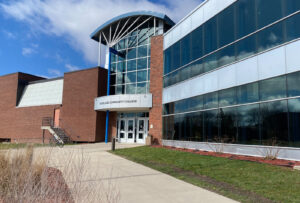
Collaboration and Communication
The Hometown Food Security Coalition, which includes Riverland and over a dozen local organizations, has become a critical step in tightening the weave of the social safety net, according to Kevin Myers, senior vice president of research and development at Hormel Foods and a board member of Riverland Community College. “Riverland being part of the coalition helps to open up communication,” Myers says. “Once that door is opened, you can really start to talk more about how we can collaborate. Individuals are doing great work on different areas of food security, but to have that overall effort being led by one group allows us to multiply our efforts across the community.”
Myers is a key facilitator of the partnership between Riverland and Hormel Foods through his roles in both organizations. He emphasized the importance of working alongside Riverland’s existing food security efforts.
As trades become increasingly high-tech, there is growing recognition of the value of community colleges and the necessity of career-directed education. “Two years of trade school puts them into a job that can be much higher paying than their parents are getting now,” Myers said. Programs like The Hormel Foundation Austin Assurance Scholarship, which allows Austin students to go to Riverland for free, and Hormel Inspired Pathways, which provides free community college for children of Hormel employees, support higher education as a way to increase financial security for individuals and their families. As Linaker observed, this is the kind of opportunity that can break the cycle of generational poverty.
Myers reflected that the ultimate goal is to reduce food insecurity at all levels and build infrastructure that will be less necessary in the future. “We’re not completely there yet, but we continue to open doors every day.”

